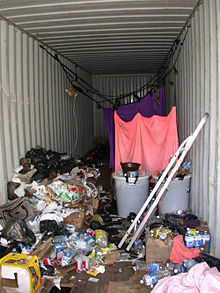| This is not a Wikipedia article: It is an individual user's work-in-progress page, and may be incomplete and/or unreliable. For guidance on developing this draft, see Wikipedia:So you made a userspace draft. Find sources: Google (books · news · scholar · free images · WP refs) · FENS · JSTOR · TWL |

Piracy has been an economic liability to nations since the 17th century, In many parts, it actually began as a legitimate occupation. Nations like England[1] and many others would essentially have what was known as "Privateers[2]", at the time. These were commissioned ships by the government, who were paid to prey on merchant ships of other countries. This was a way to make a steady liability for enemies of the nation[3], by allowing piracy[4] to happen to ships of other nations within their waters. Piracy was a gateway to cause havoc within the economic system of nations in chaos. Since the beginning of piracy, things have changed, piracy is no longer practiced the way it started by nations around the world, at least not in full effect. Piracy is still practiced in certain regions of the world as a means to make a living. This creates havoc within the economic system because pirates hijack [5] merchant ships like Oil Tankers[6] and Cargo Tankers. Which in turn makes it a liability for companies around the globe because it is product/goods that might be lost forever. The United States Maritime Administration (MARAD)[7] has placed certain plans of action to minimize piracy around the globe since the piracy problem in the Horn of Africa began to escalate in the summer of 2008[8]. They have partnered with the US Navy and the US Coast Guard to try and stabilize the rise of piracy near the coasts of Africa and in the rest of the globe. Information on this can be found in the document called Global Counter Piracy Guidance For Companies, Masters, and Seafarers[9]. This is document has updated details on piracy around the world, locations that one might want to avoid. It also has information on prevention and action if one was to encounter pirates.



It is easy for people to smuggle humans and items such as drugs because approximately two percent of ten million containers are searched in the United States. This creates a high probably that illegal imports will get by law enforcement.[10] Another major problem is Cargo theft. It is estimated that over ten billion U.S. Dollars have been lost due to cargo theft and each cargo theft is estimated at 500,000 U.S. Dollars in the United States. The U.S. Department of Transportation has made an association that the thieves that steal cargo also traffic drugs and commit money laundering crimes. Collusion at the port is a large reason how thieves are able to steal and know what to steal[11].
- ^ "England", Wikipedia, 2021-05-11, retrieved 2021-05-15
- ^ "Privateer", Wikipedia, 2021-04-21, retrieved 2021-05-15
- ^ "Nation", Wikipedia, 2021-05-14, retrieved 2021-05-15
- ^ "Piracy", Wikipedia, 2021-04-14, retrieved 2021-05-15
- ^ "Hijacking", Wikipedia, 2021-05-02, retrieved 2021-05-16
- ^ "Oil tanker", Wikipedia, 2021-05-13, retrieved 2021-05-16
- ^ "United States Maritime Administration", Wikipedia, 2021-04-16, retrieved 2021-05-16
- ^ "Office of Maritime Security | MARAD". www.maritime.dot.gov. Retrieved 2021-05-16.
- ^ www.maritimeglobalsecurity.org https://www.maritimeglobalsecurity.org/risksissues/piracy/. Retrieved 2021-05-16.
{{cite web}}: Missing or empty|title=(help) - ^ Eski, Yarin (2011-11-01). "'Port of call': Towards a criminology of port security". Criminology & Criminal Justice. 11 (5): 415–431. doi:10.1177/1748895811414593. ISSN 1748-8958.
- ^ "Port Security: A National Planning Guide". U.S. Department of Transportation: 8, 9. 1997.

